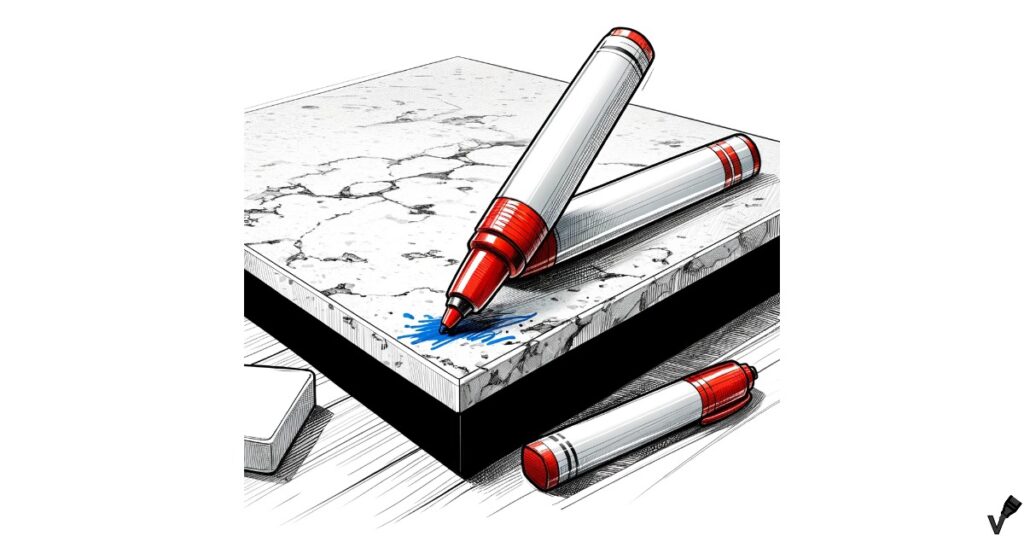Key Takeaways
- Learn how to get permanent marker off quartz
- Permanent marker stains on quartz can be removed with household items.
- Avoid abrasive cleaners to protect your quartz surface.
- Regular maintenance can prevent permanent marker stains from becoming an issue.
Understanding the Challenge of Removing Permanent Marker from Quartz
Removing permanent markers like Sharpie from quartz is no easy feat. I remember the first time I faced this issue; I was at my wit’s end trying to figure out how to get the ink out without ruining the beautiful surface. Permanent markers are designed to resist many cleaning methods, making them particularly stubborn on porous surfaces like quartz. The ink can seep into the tiny crevices, complicating the removal process. However, with the right approach, you can get your quartz surface looking as good as new without causing any damage.
The primary challenge here is the nature of quartz itself. Quartz countertops are non-porous, which makes them resistant to stains in general, but when it comes to something as intense as permanent marker ink, the game changes. The ink’s chemical properties make it bond strongly with surfaces, which is why typical cleaning methods don’t work. This is a problem because aggressive scrubbing or the use of harsh chemicals can damage the quartz, leading to dull spots or etching. But don’t worry, it’s not a lost cause. With the right techniques, you can remove even the toughest permanent marker stains without damaging your countertops.
Common Household Solutions
When I first encountered this problem, I tried a few household remedies that worked wonders. Let’s go through some of these tried and tested methods.
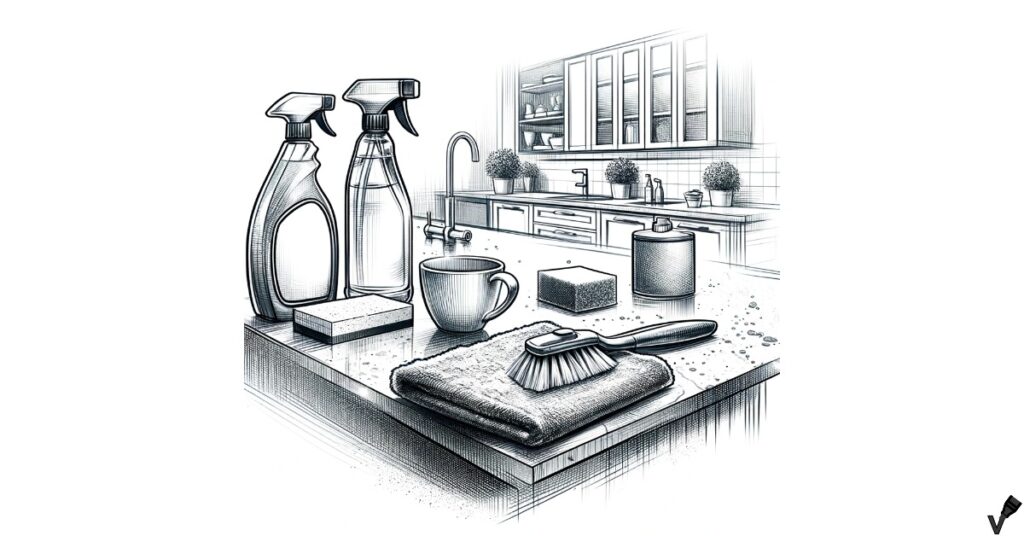
Rubbing Alcohol
Rubbing alcohol is one of my go-to solutions for tough stains like permanent marker. It’s effective because it breaks down the ink. All you need to do is soak a cotton ball in rubbing alcohol and gently rub the stain. You’ll see the ink start to lift almost immediately.
From my experience, rubbing alcohol is incredibly efficient because it is a solvent that dissolves the ink. This method works well on quartz because it doesn’t damage the surface. However, it’s crucial to use it sparingly and to not scrub too hard. A gentle, circular motion is usually sufficient to lift the stain without causing any damage to the quartz.
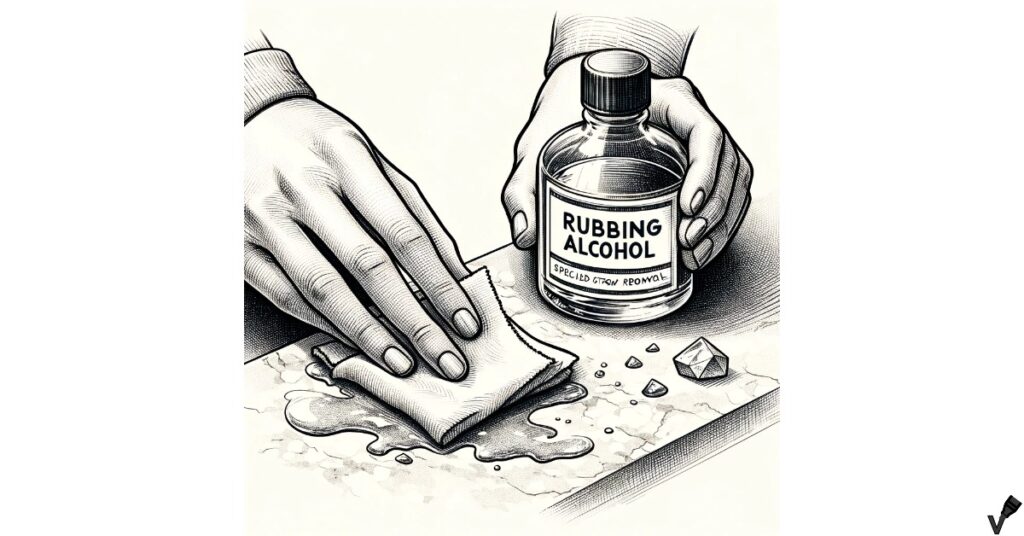
Baking Soda and Water Paste
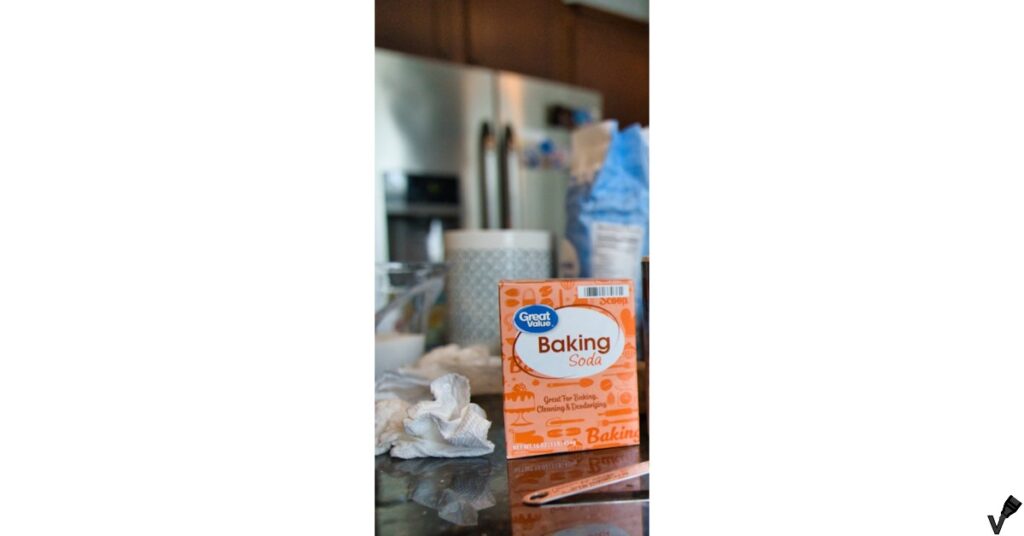
Another household remedy I’ve had success with is a baking soda and water paste. This paste acts as a mild abrasive, which is gentle enough for quartz. Mix the baking soda and water until it forms a thick paste, apply it to the stain, and let it sit for a few minutes. Then, use a soft cloth to gently scrub the area. This method can work wonders for lifting stubborn stains.
Baking soda’s mild abrasive quality helps to gently scrub away the stain without scratching the surface of the quartz. It’s a versatile cleaning agent that’s gentle yet effective, making it perfect for this purpose. This method is particularly useful for those who prefer using non-chemical solutions.
Vinegar and Dish Soap Solution
A combination of vinegar and dish soap can also be quite powerful. Mix equal parts vinegar and dish soap, apply the solution to the stained area, and scrub with a soft cloth. This method not only helps remove the stain but also leaves your quartz surface sparkling clean.
Vinegar’s acidity helps break down the ink, while the dish soap helps to lift it away. This combination works well because it tackles the stain from two angles: the vinegar dissolves the ink, and the dish soap helps to wash it away. This method is excellent for those who prefer using natural cleaning solutions over chemical ones.

Commercial Products for Stain Removal
While household solutions are great, sometimes you need something a bit stronger. There are several commercial products designed specifically for removing stains from quartz.
Magic Eraser
Magic Erasers are incredibly versatile and effective on many types of stains, including permanent marker. Wet the eraser and gently rub the stain. Be careful not to scrub too hard, as you don’t want to damage the quartz surface.
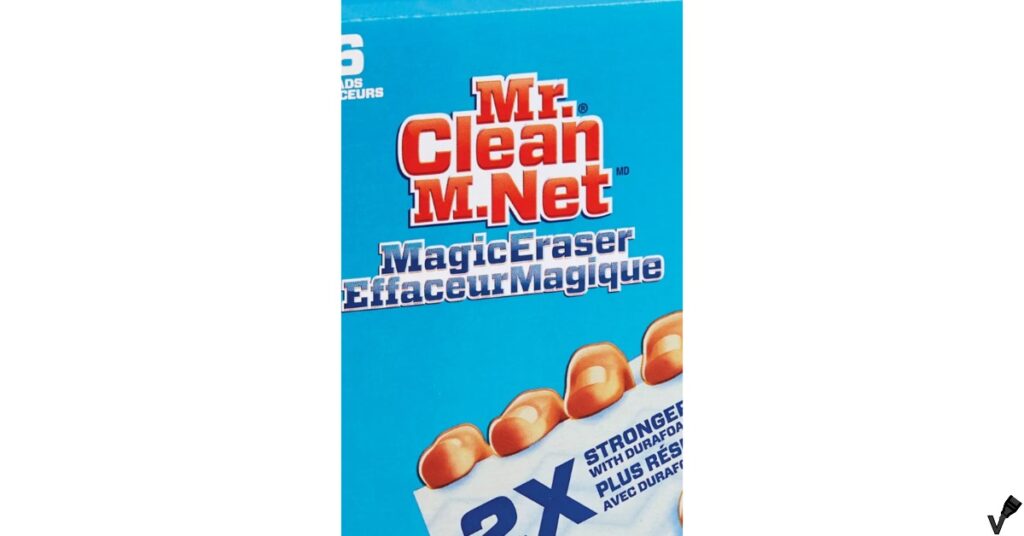
In my opinion, Magic Erasers are a must-have for any household. They’re easy to use and work quickly. However, I always make sure to test them on a small, inconspicuous area first to ensure they don’t scratch the surface.
Quartz-Safe Stain Removers
There are commercial stain removers specifically designed for quartz surfaces. These products are formulated to tackle tough stains without damaging the quartz. Follow the instructions on the product, and you should see great results.
When I had a particularly stubborn stain, I turned to a commercial quartz-safe stain remover. These products are designed to be safe for quartz and are often more effective than household remedies. They’re a bit pricier, but in my opinion, they’re worth it for particularly tough stains.
Precautions to Take When Cleaning Quartz
Quartz is durable but delicate, requiring careful cleaning to avoid damage. Always test any cleaning solution on a small, inconspicuous area first to ensure it doesn’t cause any harm. Avoid using bleach, ammonia, or any acidic cleaners that can etch the surface. Stick to soft cloths or sponges rather than abrasive pads to avoid scratches.
I’ve learned the hard way that being gentle is key. Quartz can withstand a lot, but harsh chemicals and aggressive scrubbing can cause permanent damage. It’s always better to err on the side of caution.
Preventive Measures to Avoid Future Stains
To keep your quartz looking pristine, use cutting boards, trivets, and placemats to protect the surface. Clean up spills promptly to prevent them from setting in. Additionally, regularly sealing your quartz countertops if they aren’t factory-sealed can provide extra protection against stains.
Prevention is always better than cure. By taking a few simple precautions, you can avoid the headache of dealing with permanent marker stains altogether. I always use cutting boards and trivets, and I make sure to clean up spills as soon as they happen. This habit has saved me a lot of trouble over the years.
Detailed Step-by-Step Guide
Step 1: Gather Your Materials
You’ll need rubbing alcohol, baking soda, water, vinegar, dish soap, soft cloths, a Magic Eraser (optional), and a quartz-safe stain remover (optional).
Before starting, make sure you have everything you need. It’s frustrating to start the cleaning process only to realize you’re missing something crucial.
Step 2: Test the Cleaning Solution
Before applying any cleaning solution, test it on a small, hidden area of your quartz surface to ensure it doesn’t cause damage.
This step is crucial. Testing the solution in an inconspicuous area ensures that if there’s any adverse reaction, it won’t be visible.
Step 3: Apply the Cleaning Solution
Depending on the method you’re using, apply the cleaning solution to the stain. For rubbing alcohol, soak a cotton ball and gently rub the stain. For baking soda paste, apply the paste and let it sit before scrubbing gently.
Apply the solution carefully. You don’t need a lot; just enough to cover the stain.
Step 4: Gently Scrub the Stain
Use a soft cloth or sponge to scrub the stain gently. Avoid using excessive force to prevent damaging the quartz.
Gentle scrubbing is key. You want to lift the stain without scratching the surface.
Step 5: Rinse and Dry
After removing the stain, rinse the area with clean water and dry it with a soft cloth to remove any residue from the cleaning solution.
This step ensures that no cleaning solution is left behind. Residue can sometimes attract dirt, making your countertop look dirty even after you’ve cleaned it.
Step 6: Inspect and Repeat if Necessary
Check the cleaned area to ensure the stain is gone. If any stain remains, repeat the process until the quartz is clean.
Sometimes, a single round of cleaning isn’t enough. Inspect the area closely, and if necessary, repeat the process.
Conclusion
Removing permanent marker from quartz can be tricky, but with the right techniques, it’s definitely doable. By using gentle, effective cleaning methods and taking preventive measures, you can keep your quartz surfaces looking pristine for years to come.
In my experience, the key is patience and gentleness. Don’t rush the process, and don’t be too harsh on your quartz. With the right approach, you can remove even the toughest stains without causing damage. For more detailed cleaning tips and professional advice, you can check out resources like Caesarstone’s cleaning guide and Guilin Cabinets’ maintenance tips.
FAQs
-
How do I remove permanent marker from quartz without damaging it?
Use gentle, non-abrasive methods like rubbing alcohol, baking soda paste, or commercial quartz cleaners. Avoid harsh chemicals and abrasive tools. -
Can I use acetone on quartz surfaces?
Acetone can be used cautiously on quartz, but always test it on a small area first. Prolonged exposure can damage the surface. -
What should I avoid when cleaning quartz?
Avoid bleach, ammonia, and acidic cleaners. Do not use abrasive scrubbing pads or steel wool, as these can scratch and damage the quartz surface. -
Can hydrogen peroxide be used to clean permanent marker stains from quartz?
Yes, hydrogen peroxide can be used to clean permanent marker stains from quartz. Apply it to the stain and let it sit for a few minutes before wiping it away with a soft cloth. Always test it in an inconspicuous area first. -
What household items can remove permanent marker from quartz?
Household items like rubbing alcohol, baking soda and water paste, and a mixture of vinegar and dish soap can effectively remove permanent marker from quartz surfaces. -
How can I prevent permanent marker stains on quartz?
To prevent permanent marker stains, use cutting boards, trivets, and placemats to protect your quartz surfaces. Clean up spills promptly and regularly seal your quartz countertops if they aren’t factory-sealed.

